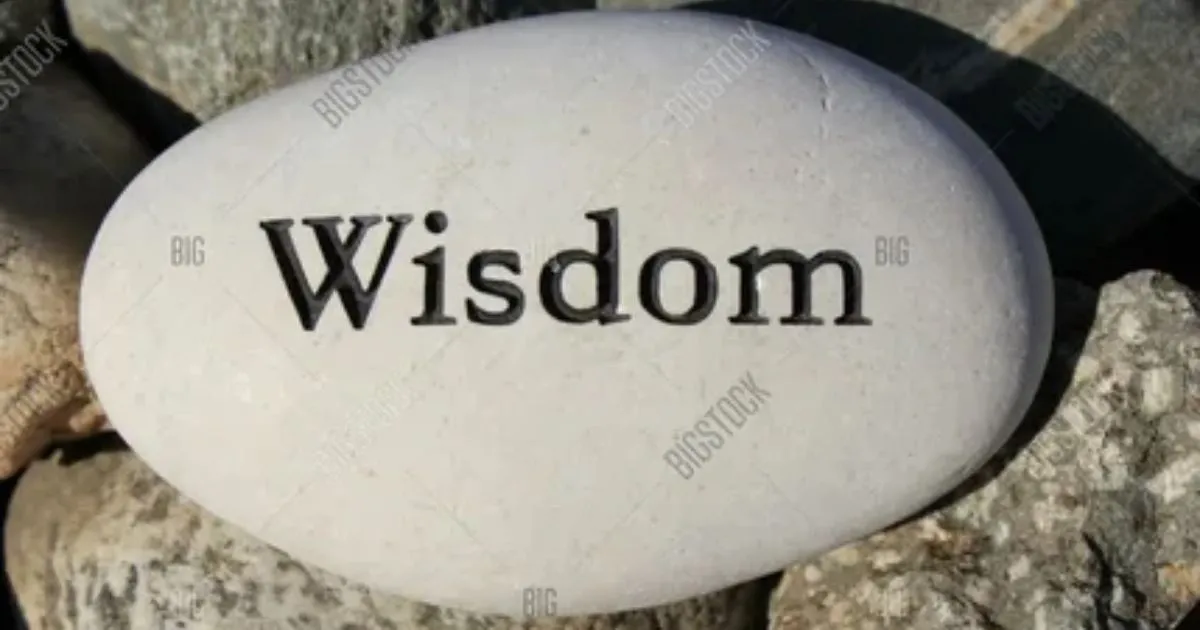“Wisdom is not a product of schooling, but of the lifelong attempt to acquire it.”
In a world where knowledge is abundant but true understanding remains elusive, wisdom shines as the rare and invaluable quality that guides us through life’s complexities. Unlike knowledge, which can be acquired through formal education or vast reading, wisdom is cultivated through experience, reflection, and an open mind.
It’s the silent yet powerful force that enables people to see beyond immediate facts, think deeply, and act with purpose. Wisdom is often revered but not always clearly defined, making it a treasure that everyone seeks but few truly grasp.
From ancient philosophers to modern thinkers, wisdom has been celebrated as a virtue that stands above all others. The ancients saw wisdom as the foundation of a fulfilling and ethical life, and today, it remains central to personal growth and meaningful relationships.
It’s wisdom that helps individuals navigate challenges, understand different perspectives, and find inner peace amid life’s chaos. In many ways, wisdom serves as the compass that directs us toward our highest potential, elevating our actions and intentions beyond what mere knowledge alone can achieve.
The journey to wisdom is personal and lifelong, shaped by our unique experiences, choices, and willingness to learn. It requires humility, patience, and an eagerness to question and understand.
As we delve deeper into the nature of wisdom, we come to appreciate that it is not just an intellectual pursuit; it’s a way of being that enriches every aspect of our lives. Embracing wisdom empowers us to live authentically, make thoughtful decisions, and contribute positively to the world around us.
1.Understanding the Essence of Wisdom
- Definition of Wisdom – A deep understanding of life and human nature.

- Difference from Knowledge – Wisdom is distinct from mere facts; it’s the ability to apply knowledge effectively.
- Historical Perspective – Revered since ancient times as the highest virtue.
- Philosophical Roots – Central to the teachings of Socrates, Confucius, and Buddha.
- Cultural Interpretations – Various societies have unique views on what it means to be wise.
- Wisdom in Religion – Celebrated across religions as a spiritual and moral ideal.
- Self-awareness – An essential component in understanding one’s strengths and weaknesses.
- Empathy – Wisdom often involves a deep empathy for others’ perspectives.
- Balance – The ability to balance emotions, thoughts, and actions.
- Compassionate Action – Wisdom leads to compassionate, thoughtful decisions.
- Humility – Recognizing one’s limitations is key to wisdom.
- Critical Thinking – The ability to analyze situations objectively and fairly.
- Patience – Taking time to understand situations before acting.
- Curiosity – A wise person is always open to learning more.
- Openness to Experience – Being receptive to new ideas and perspectives.
- Adaptability – Adjusting actions and beliefs when faced with new information.
- Listening Skills – Wisdom involves attentive listening and valuing others’ input.
- Ethical Living – Wisdom encourages moral integrity and honesty.
- Self-reflection – Continuously evaluating one’s actions and beliefs.
- Learning from Mistakes – Wisdom involves understanding the value of failure.
- Inner Peace – Wisdom helps foster a calm and centered mindset.
- Tolerance for Ambiguity – The ability to accept uncertainty in life.

- Growth Mindset – Recognizing that learning is a lifelong journey.
- Maturity – Wisdom is often associated with emotional maturity.
- Long-term Vision – Focusing on bigger, long-term goals rather than short-term gains.
- Judgment – Making decisions based on sound reasoning.
- Resilience – Maintaining strength and flexibility in the face of hardship.
- Ethical Decision-making – Choosing actions that are morally sound.
- Courage – Having the strength to stand by one’s values and beliefs.
- Empowerment of Others – Wisdom often involves helping others reach their potential.
- Forgiveness – Letting go of resentment as a path to inner peace.
- Simplicity – Understanding the value of simple, authentic living.
- Discipline – Practicing self-control in thoughts and actions.
- Moderation – Avoiding extremes and finding a balanced approach to life.
- Awareness of Interconnectedness – Recognizing the web of relationships around us.
- Respect for Others – Valuing diversity and different viewpoints.
- Seeking Truth – Continuously striving for deeper truths.
- Mindfulness – Living in the present and being aware of the moment.
- Responsibility – A wise person takes responsibility for their actions.
- Practicality – Applying abstract knowledge in real-life scenarios.
- Self-acceptance – Embracing oneself fully, with flaws and strengths.
- Contentment – Finding happiness in the present rather than constantly seeking more.
- Empirical Learning – Wisdom is often acquired through direct experience.
- Ability to Change – Wisdom involves evolving beliefs based on new insights.
- Alignment with Values – Making choices that align with one’s core values.
- Civic Responsibility – Wisdom includes contributing positively to society.
- Introspection – Reflecting on one’s actions and motives regularly.
- Non-judgmental Approach – Avoiding quick judgments and biases.

- Effective Communication – Knowing when to speak and when to listen.
- Self-restraint – The ability to control impulses and delay gratification.
- Reliability – Wisdom fosters trustworthiness and dependability.
- Seeking Peace – Valuing harmony over conflict.
- Openness to Correction – Being willing to admit mistakes and learn from them.
- Gratitude – Recognizing and appreciating life’s blessings.
- Purpose-driven Actions – Acting with a sense of purpose and direction.
- Broad Perspective – Seeing beyond immediate concerns to the bigger picture.
- Accepting Mortality – Wisdom includes an understanding of life’s impermanence.
- Realizing the Limits of Control – Accepting what one cannot change.
- Empowering Others – Encouraging others to achieve their potential.
- Embracing Change – Adapting to life’s inevitable changes.
- Using Knowledge Judiciously – Knowing what to say, when, and to whom.
- Listening to Inner Guidance – Trusting one’s intuition when making decisions.
- Endurance – The strength to persevere through difficulties.
- Honesty with Oneself – Being truthful and transparent with oneself.
- Avoiding Superficiality – Seeking depth over appearances.
- Valuing Relationships – Recognizing the importance of human connections.
- Seeking Balance in All Aspects – Maintaining equilibrium in life.
- Respect for Nature – Understanding our place in the natural world.

- Legacy of Wisdom – The desire to pass on wisdom to future generations.
- Self-fulfillment – Wisdom as a source of personal fulfillment and inner joy.
2.The Path to Acquiring Wisdom
- Embracing Lifelong Learning – Continuously seeking knowledge beyond formal education.
- Learning from Failures – Viewing mistakes as valuable lessons.
- Accepting Humility – Recognizing that no one knows everything.
- Practicing Patience – Understanding that wisdom takes time to cultivate.
- Listening to Others – Valuing others’ perspectives and experiences.
- Self-reflection – Regularly examining one’s actions, thoughts, and motives.
- Setting Aside Ego – Being open to correction and growth.

- Learning from Role Models – Observing wise individuals and adopting their qualities.
- Critical Thinking – Questioning assumptions and seeking deeper understanding.
- Mindfulness – Staying present and aware of one’s thoughts and actions.
- Seeking Guidance from Mentors – Relying on trusted advisors for insight.
- Building Emotional Intelligence – Understanding and managing emotions.
- Practicing Empathy – Seeing situations from others’ viewpoints.
- Cultivating Curiosity – Embracing a desire to understand the world.
- Overcoming Biases – Working to see past personal preconceptions.
- Valuing Silence – Reflecting in quiet moments for clearer insights.
- Forging Strong Ethics – Developing a moral compass that guides actions.
- Learning Through Reading – Gaining insights from literature, philosophy, and history.
- Exploring New Cultures – Broadening perspectives through cultural exchange.
- Balancing Logic and Emotion – Making well-rounded decisions.
- Practicing Self-control – Cultivating discipline over impulses.
- Adapting to Change – Staying open to transformation and growth.
- Seeking Inner Peace – Pursuing tranquility as a foundation for wise choices.
- Embracing Vulnerability – Accepting imperfections as part of growth.
- Accepting Life’s Uncertainties – Learning to be comfortable with ambiguity.
- Learning from Nature – Observing life cycles and natural order for perspective.
- Building Resilience – Growing through hardship.
- Engaging in Community – Learning from the collective wisdom of groups.

- Maintaining Integrity – Staying true to one’s values and principles.
- Practicing Gratitude – Recognizing and appreciating life’s gifts.
- Valuing Experience Over Material Wealth – Understanding that life experiences are invaluable.
- Avoiding Superficial Judgments – Looking beyond appearances to understand depth.
- Engaging in Deep Conversations – Pursuing meaningful discussions.
- Accepting Constructive Criticism – Using feedback for self-improvement.
- Reflecting on Personal Values – Aligning actions with core beliefs.
- Overcoming Fears – Courageously facing challenges.
- Using Self-compassion – Forgiving oneself to enable growth.
- Respecting Diverse Perspectives – Seeing value in varied worldviews.
- Living with Purpose – Acting intentionally and meaningfully.
- Letting Go of the Past – Releasing regrets to focus on the present.
- Learning to Forgive – Understanding that forgiveness is essential for peace.
- Applying Knowledge Practically – Using insights to make real-world improvements.
- Journaling for Clarity – Writing down thoughts to clarify emotions.
- Developing Self-awareness – Knowing oneself deeply.
- Practicing Discipline – Building habits that support growth.
- Avoiding Instant Gratification – Focusing on long-term rewards.
- Building Healthy Relationships – Surrounding oneself with supportive individuals.
- Exploring New Ideas – Keeping an open mind toward new concepts.
- Seeking Balance in Life – Maintaining harmony across personal and professional spheres.
- Learning to Set Boundaries – Protecting personal well-being and mental health.

- Embracing Self-doubt as Growth – Recognizing uncertainty as part of learning.
- Choosing Reflection Over Reaction – Responding thoughtfully rather than impulsively.
- Experiencing Diverse Environments – Gaining wisdom through varied surroundings.
- Recognizing the Value of Silence – Finding clarity and insight in quiet moments.
- Practicing Mindful Observation – Noticing details and nuances in life.
- Valuing Elders’ Wisdom – Learning from those with more life experience.
- Avoiding Overconfidence – Staying humble about one’s abilities.
- Trusting Intuition – Listening to one’s inner guidance.
- Overcoming Perfectionism – Accepting that growth often involves imperfection.
- Practicing Fairness and Justice – Striving to make equitable choices.
- Reflecting on Long-term Consequences – Considering how actions affect the future.
- Encouraging Others’ Growth – Inspiring and supporting those around us.
- Recognizing the Power of Small Acts – Understanding that small choices shape character.
- Distinguishing Wants from Needs – Prioritizing essentials for well-being.
- Appreciating Life’s Cycles – Recognizing and accepting life’s phases.
- Revisiting Old Beliefs – Evaluating and revising outdated views.
- Learning to Appreciate Simplicity – Finding beauty in a minimalist approach.
- Valuing Self-sufficiency – Developing independence and resilience.

- Being Accountable – Taking responsibility for one’s actions.
- Staying Open to New Possibilities – Remaining adaptable and receptive to growth.
Journal Quote
3.Applying Wisdom in Everyday Life
- Mindful Decision-Making – Taking time to think through choices before acting.
- Prioritizing Relationships – Valuing connections and nurturing friendships.
- Listening Actively – Fully engaging when others speak to understand their perspectives.
- Practicing Gratitude – Acknowledging and appreciating the positives in life daily.
- Setting Clear Goals – Establishing meaningful objectives to guide actions.
- Embracing Flexibility – Adapting plans as situations change.
- Cultivating Empathy – Understanding and sharing the feelings of others.
- Reflecting on Daily Experiences – Taking time to consider lessons learned from each day.
- Making Time for Self-Care – Prioritizing physical and mental well-being.
- Choosing Kindness – Acting with compassion in interactions with others.

- Seeking Balance – Striving for harmony between work, leisure, and personal life.
- Using Wisdom in Conflict Resolution – Approaching disagreements with calm and understanding.
- Practicing Patience – Allowing time for processes to unfold naturally.
- Encouraging Open Dialogue – Fostering honest communication with others.
- Learning to Say No – Setting boundaries to protect one’s time and energy.
- Applying Knowledge to Problem-Solving – Using experience to address challenges effectively.
- Building Trust – Being consistent and reliable in actions and words.
- Emphasizing Integrity – Making choices aligned with personal values.
- Continuing Education – Engaging in lifelong learning to expand knowledge.
- Celebrating Small Wins – Recognizing and appreciating incremental progress.
- Practicing Mindfulness – Staying present to enhance awareness and focus.
- Seeking Feedback – Welcoming constructive criticism to grow.
- Fostering Resilience – Bouncing back from setbacks with a positive attitude.
- Connecting with Nature – Spending time outdoors to gain perspective and clarity.
- Valuing Diversity – Embracing differences to enrich understanding.
- Cultivating a Positive Mindset – Focusing on the good and maintaining optimism.

- Engaging in Community Service – Contributing to the well-being of others.
- Staying Curious – Asking questions and seeking deeper understanding.
- Practicing Forgiveness – Letting go of grudges to find peace.
- Balancing Logic and Emotion – Weighing facts and feelings in decision-making.
- Using Humor Wisely – Lightening difficult situations with appropriate humor.
- Developing Self-Discipline – Exercising control over impulses and desires.
- Creating Healthy Routines – Establishing habits that support overall well-being.
- Taking Responsibility – Owning up to mistakes and learning from them.
- Practicing Non-judgment – Accepting others without harsh criticism.
- Finding Meaning in Challenges – Seeking lessons and growth from difficult situations.
- Encouraging Team Collaboration – Fostering a spirit of teamwork in group settings.
- Reflecting on Personal Values – Regularly assessing alignment between actions and beliefs.
- Using Technology Wisely – Leveraging tools to enhance life without becoming overly reliant.
- Setting Intentions – Starting each day with clear, purposeful goals.
- Avoiding Comparisons – Focusing on personal growth rather than measuring against others.
- Practicing Mindful Eating – Being conscious of food choices and their impact on health.
- Recognizing Limits – Understanding when to take a break or step back.
- Creating a Vision Board – Visualizing goals and aspirations to enhance motivation.
- Staying Grounded – Practicing techniques to maintain calm during stressful situations.

- Utilizing Time Management Skills – Organizing tasks to maximize productivity.
- Encouraging Lifelong Friendships – Nurturing long-term relationships for support and joy.
- Being Open to Change – Welcoming new ideas and possibilities.
- Practicing Active Gratitude – Writing down things to be grateful for regularly.
- Supporting Others’ Growth – Encouraging friends and colleagues to develop their skills.
- Engaging in Reflective Writing – Journaling to process thoughts and experiences.
- Valuing Rest and Recovery – Recognizing the importance of downtime for productivity.
- Asking for Help When Needed – Being open to assistance from others.
- Incorporating Spiritual Practices – Exploring faith or spirituality for guidance and comfort.
- Exploring New Hobbies – Engaging in activities that stimulate creativity and joy.
- Practicing Sustainability – Making choices that benefit the environment and future generations.
- Encouraging Innovation – Being open to new ideas and methods in personal and professional life.
- Recognizing Successes in Others – Celebrating achievements to build community spirit.
- Participating in Group Discussions – Engaging with others to explore diverse viewpoints.
- Learning to Meditate – Incorporating meditation for clarity and calmness.
- Nurturing Creativity – Allowing time for creative expression in daily life.
- Understanding Cultural Contexts – Recognizing how background shapes beliefs and behaviors.
- Being Authentic – Staying true to oneself in all situations.
- Utilizing Visualization Techniques – Imagining desired outcomes to manifest goals.
- Engaging in Public Speaking – Sharing insights and wisdom with others through effective communication.
- Recognizing Non-verbal Cues – Paying attention to body language and tone in conversations.
- Reflecting on Past Experiences – Using history as a guide for current decisions.
- Finding Joy in Simplicity – Appreciating everyday moments without needing extravagance.

- Supporting Mental Health – Prioritizing mental wellness in oneself and others.
- Living with Intention – Making conscious choices aligned with values and goals.
FAQs
1. What is the importance of applying wisdom in daily life?
Applying wisdom in daily life helps individuals make better decisions, enhance relationships, and navigate challenges effectively. It encourages thoughtful actions, fosters empathy, and promotes a more fulfilling life.
2. How can I start incorporating wisdom into my daily routine?
You can start by practicing mindfulness, reflecting on your experiences, and setting clear intentions each day. Additionally, prioritizing relationships, seeking feedback, and cultivating gratitude can significantly enhance your application of wisdom.
3. Can wisdom be learned, or is it innate?
Wisdom can be cultivated through experiences, education, and self-reflection. While some individuals may have a natural inclination towards wise decision-making, everyone has the potential to develop wisdom through conscious practice and learning.
4. How does emotional intelligence relate to wisdom?
Emotional intelligence is a crucial component of wisdom. It involves recognizing and managing one’s emotions and understanding others’ feelings. Higher emotional intelligence allows for better decision-making, conflict resolution, and relationship-building, all of which are essential for applying wisdom effectively.
5. What role does self-reflection play in acquiring wisdom?
Self-reflection is vital for wisdom as it enables individuals to analyze their thoughts, actions, and motivations. By reflecting on past experiences and learning from them, individuals can make more informed decisions and grow in their understanding of themselves and the world around them.
Conclusion
Incorporating wisdom into everyday life is a transformative journey that enriches our experiences and enhances our relationships. By practicing mindful decision-making, embracing empathy, and reflecting on our actions, we can navigate the complexities of life with greater clarity and purpose.
Wisdom is not just a destination but a continuous process that involves learning, growing, and adapting. As we cultivate these practices, we not only improve our lives but also positively influence those around us, creating a more compassionate and understanding world.
Ultimately, applying wisdom in our daily lives empowers us to live more authentically, align our actions with our values, and find deeper meaning in every moment.

Hi! I’m Lauren Reynolds, a writer at Prayers Echo, sharing comforting prayers, religious affirmations, and timeless psalms to bring peace and hope.












